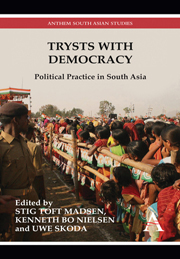Book contents
- Frontmatter
- Contents
- List of Tables
- List of Abbreviations
- Glossary
- Map of South Asia
- Acknowledgements
- 1 Introduction
- Part One Theoretical Issues
- Part Two India
- Part Three Beyond India
- 8 Nepal: Governance and Democracy in a Frail State
- 9 Entanglements of Politics and Education in Sri Lanka
- 10 Shifting between the Local and Transnational: Space, Power and Politics in War-torn Sri Lanka
- 11 Domestic Roots of Indian Foreign Policy
- 12 When Democracy is Not the Only Game in Town: Sectarian Conflicts in Pakistan
- About the Editors
- About the Contributors
12 - When Democracy is Not the Only Game in Town: Sectarian Conflicts in Pakistan
from Part Three - Beyond India
Published online by Cambridge University Press: 05 March 2012
- Frontmatter
- Contents
- List of Tables
- List of Abbreviations
- Glossary
- Map of South Asia
- Acknowledgements
- 1 Introduction
- Part One Theoretical Issues
- Part Two India
- Part Three Beyond India
- 8 Nepal: Governance and Democracy in a Frail State
- 9 Entanglements of Politics and Education in Sri Lanka
- 10 Shifting between the Local and Transnational: Space, Power and Politics in War-torn Sri Lanka
- 11 Domestic Roots of Indian Foreign Policy
- 12 When Democracy is Not the Only Game in Town: Sectarian Conflicts in Pakistan
- About the Editors
- About the Contributors
Summary
Inside the Islamic Republic of Pakistan Muslim unity is riven by sectarian conflicts many of which may be traced to the denominational division between Sunnis and Shias. Among the Sunnis, the division between Barelwis and Deobandis has proved equally conflictual. In this article, I will present a short historical account of the emergence of different Islamic schools of thought and their main organisations. I concentrate particularly on the sharpening of the tensions between them from the 1980s onwards. That such tensions remain to this day and age is witnessed by the suicide attack on a Shia mourning procession in Lahore on 1 September 2010 killing 31 people, and by the attack by suicide bombers on the Data Darbar Sufishrine in Lahore on 1 July 2010, killing 42. In the end of the article, I will consider ‘neo-fundamentalist’ alternatives to Islamist and sectarian militancy that has taken on a warlike appearance in Pakistan. Possibly, the religious rationalities behind fundamentalist projects and radical movements may eventually turn into a new and less violent post- Islamist interpretation of Islam.
While the Sunni-Shia conflict is endemic to several countries of the Islamic world, South Asia has developed a specific tradition of conflict internal to the Sunnis. In the late nineteenth century, theological debates revolved around questions of the qualities of the prophet Muhammad.
- Type
- Chapter
- Information
- Trysts with DemocracyPolitical Practice in South Asia, pp. 281 - 296Publisher: Anthem PressPrint publication year: 2011



